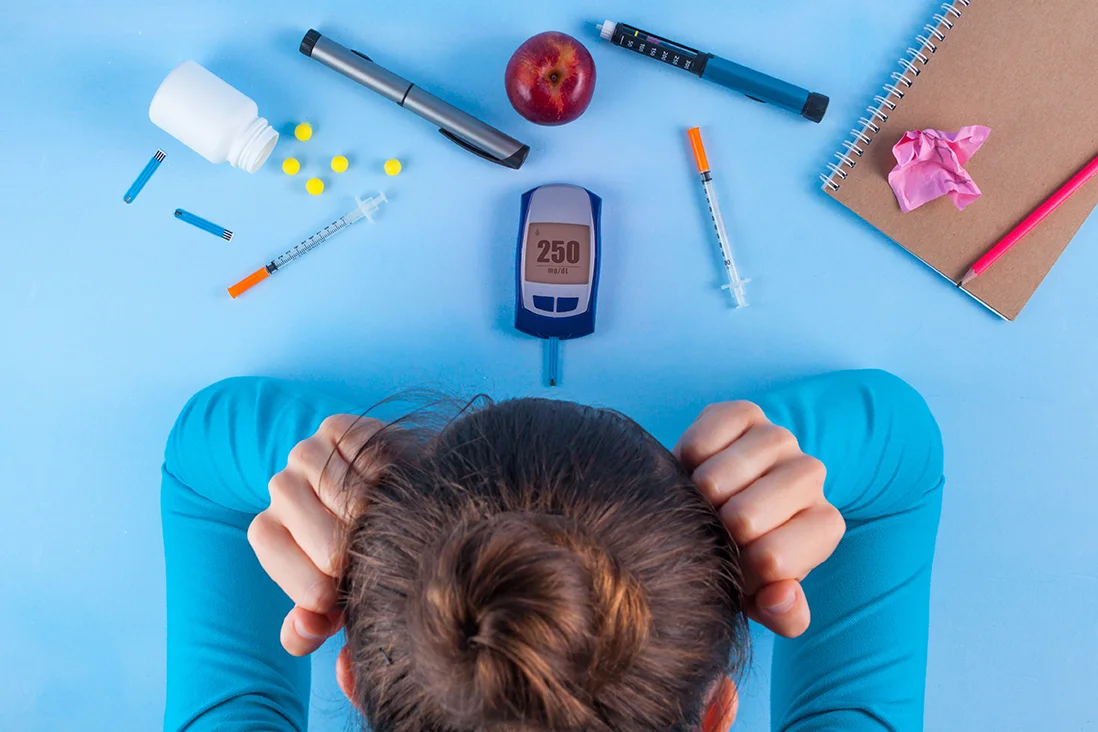Context:
On World Diabetes Day (November 14), clinicians highlighted the growing link between chronic workplace stress and the rising cases of Type 2 Diabetes Mellitus (T2DM) among younger working-age adults in India, particularly in sectors like tech, finance, and night shift workers.
Key Details:
- Escalating Burden: India’s diabetes burden is severe, with the ICMR-INDIAB study (2023) estimating that 101 million people in India had diabetes in 2021, and 136 million were pre-diabetic.
- Younger Onset: The onset of T2DM is being observed at a younger age and often in individuals with a lower BMI than in Western populations, indicating that genetic predisposition combined with lifestyle factors is accelerating the disease.
- Risk Groups: The highest risk is observed in millennials and corporate employees in sedentary, high-pressure jobs (IT, BPO, finance), driven by long work hours, inconsistent routines, and poor sleep quality.
- Sedentary Culture: Prolonged sitting and desk-bound jobs contribute significantly to abdominal obesity, a critical risk factor and a key precursor to insulin resistance.
- Early Metabolic Signs: Doctors are observing early metabolic indicators in stressed individuals, such as high cortisol levels, borderline blood pressure, and poor sleep scores, which, if unmanaged, progress rapidly to T2DM.
- Night Shift Risk: Individuals working night shifts are at particularly high risk due to the disruption of the body’s natural circadian rhythm, which significantly affects glucose tolerance and insulin sensitivity.
Pathophysiological Mechanism of Stress:
- Hormonal Imbalance: Chronic stress triggers the release of stress hormones like cortisol and adrenaline (epinephrine and norepinephrine) via the Hypothalamic-Pituitary-Adrenal (HPA) axis.
- Insulin Resistance: These stress hormones antagonize the action of insulin, causing insulin resistance in muscle and fat cells and inhibiting glucose absorption, which is the hallmark of T2DM.
- Glucose Production: Cortisol stimulates the liver to produce more glucose (gluconeogenesis) and release it into the bloodstream to prepare for the “fight or flight” response, leading to chronic high blood sugar (hyperglycemia).
- Visceral Fat Accumulation: Chronic stress promotes the redistribution and accumulation of metabolically harmful visceral fat around the abdomen, which further exacerbates insulin resistance and metabolic dysfunction.
- Indirect Effects: Stress often leads to negative coping behaviors such as comfort eating (high-sugar, high-fat foods), reduced physical activity, smoking, and sleep disruption, creating a vicious cycle of weight gain and rising diabetes risk.
Need for Supportive Policies and Intervention:
- Workplace Wellness: Organizations must adopt supportive policies to mitigate stress, including promoting flexible working hours, ensuring breaks for physical movement, and discouraging excessively long working hours.
- Holistic Management: Managing diabetes in stressed adults requires a holistic approach that goes beyond diet and medication to include stress management techniques like mindfulness and counselling to restore sleep and circadian rhythm.
- Proactive Screening: There is a crucial need for proactive and regular screening of employees, particularly those in high-stress, sedentary roles, to detect pre-diabetes and early metabolic changes before they progress to full-blown diabetes.
- Focus on Prevention: Experts advocate for simple, actionable lifestyle modifications at the workplace, such as incorporating short periods of movement every hour and providing access to healthy cafeteria options, to reduce stress and metabolic burden.

